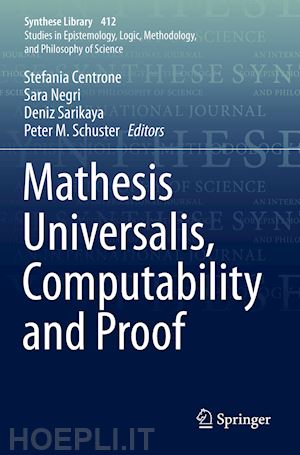
Questo prodotto usufruisce delle SPEDIZIONI GRATIS
selezionando l'opzione Corriere Veloce in fase di ordine.
Pagabile anche con Carta della cultura giovani e del merito, 18App Bonus Cultura e Carta del Docente
In a fragment entitled Elementa Nova Matheseos Universalis (1683?) Leibniz writes “the mathesis […] shall deliver the method through which things that are conceivable can be exactly determined”; in another fragment he takes the mathesis to be “the science of all things that are conceivable.” Leibniz considers all mathematical disciplines as branches of the mathesis and conceives the mathesis as a general science of forms applicable not only to magnitudes but to every object that exists in our imagination, i.e. that is possible at least in principle. As a general science of forms the mathesis investigates possible relations between “arbitrary objects” (“objets quelconques”). It is an abstract theory of combinations and relations among objects whatsoever.
In 1810 the mathematician and philosopher Bernard Bolzano published a booklet entitled Contributions to a Better-Grounded Presentation of Mathematics. There is, according to him, a certain objective connection among the truths that are germane to a certain homogeneous field of objects: some truths are the “reasons” (“Gründe”) of others, and the latter are “consequences” (“Folgen”) of the former. The reason-consequence relation seems to be the counterpart of causality at the level of a relation between true propositions. Arigorous proof is characterized in this context as a proof that shows the reason of the proposition that is to be proven. Requirements imposed on rigorous proofs seem to anticipate normalization results in current proof theory.
The contributors of Mathesis Universalis, Computability and Proof, leading experts in the fields of computer science, mathematics, logic and philosophy, show the evolution of these and related ideas exploring topics in proof theory, computability theory, intuitionisticlogic, constructivism and reverse mathematics, delving deeply into a contextual examination of the relationship between mathematical rigor and demands for simplification.
Stefania Centrone is currently Privatdozentin at the University of Hamburg, teaches and does research at the Universities of Oldenburg and of Helsinki and has been in 2016 deputy Professor of Theoretical Philosophy at the University of Göttingen. In 2012 she was awarded a DFG-Eigene Stelle for the project Bolzanos und Husserls Weiterentwicklung von Leibnizens Ideen zur Mathesis Universalis and 2017 a Heisenberg grant. She is author of the volumes Logic and philosophy of Mathematics in the Early Husserl (Synthese Library 2010) and Studien zu Bolzano (Academia Verlag 2015).
Sara Negri is Professor of Theoretical Philosophy at the University of Helsinki, where she has been a Docent of Logic since 1998. After a PhD in Mathematics in 1996 at the University of Padova and research visits at the University of Amsterdam and Chalmers, she has been a research associate at the Imperial College in London, a Humboldt Fellow in Munich, and a visiting scientist at the Mittag-Leffler Institute in Stockholm. Her research interests range from mathematical logic and philosophy of mathematics to proof theory and its applications to philosophical logic and formal epistemology.
Deniz Sarikaya is PhD-Student of Philosophy and studies Mathematics at the University of Hamburg with experience abroad at the Universiteit van Amsterdam and Universidad de Barcelona. He stayed a term as a Visiting Student Researcher at the University of California, Berkeley developing a project on the Philosophy of Mathematical Practice concerning the Philosophical impact of the usage of automatic theorem prover and as a RISE research intern at the University of British Columbia. He is mainly focusing on philosophy of mathematics and logic.











Il sito utilizza cookie ed altri strumenti di tracciamento che raccolgono informazioni dal dispositivo dell’utente. Oltre ai cookie tecnici ed analitici aggregati, strettamente necessari per il funzionamento di questo sito web, previo consenso dell’utente possono essere installati cookie di profilazione e marketing e cookie dei social media. Cliccando su “Accetto tutti i cookie” saranno attivate tutte le categorie di cookie. Per accettare solo deterninate categorie di cookie, cliccare invece su “Impostazioni cookie”. Chiudendo il banner o continuando a navigare saranno installati solo cookie tecnici. Per maggiori dettagli, consultare la Cookie Policy.